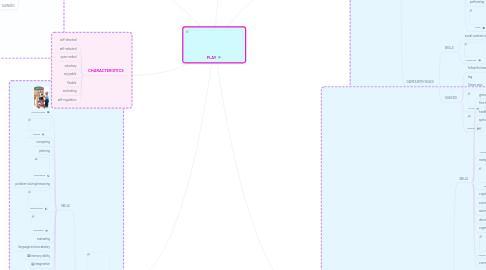
1. PRETEND PLAY
1.1. SKILLS
1.1.1. communication
1.1.2. thinking
1.1.3. comparing
1.1.4. planning
1.1.5. investigating
1.1.6. problem-solving/reasoning
1.1.7. experimenting
1.1.8. negotiating
1.1.9. evaluating
1.1.10. language and vocabulary
1.1.11. memory ability
1.1.12. imagination
1.1.13. abstract
1.1.14. emotions
1.1.15. social
1.2. GAIN/DO
1.2.1. perspective
1.2.2. cooperation
1.2.3. mental representation
1.2.4. make-believe
1.2.5. ideas
1.2.6. concepts
1.2.7. dreams
1.2.8. histories
2. SOCIAL PLAY
2.1. SKILLS
2.1.1. literacy acquisition
2.1.2. narrative recall
2.1.3. specific vocabulary
2.1.4. development of schemas
2.1.5. organization of mental scripts
2.1.6. abstract thinking
2.1.7. problem-solving
2.1.8. control
2.1.9. verbal communication
2.1.10. empathy
2.1.11. moral reasoning
2.2. GAIN/DO
2.2.1. tasks and goals oriented
2.2.2. perspective
2.2.3. storytelling
2.2.4. environmental print
2.2.5. interaction
2.2.6. body language
2.2.7. environmental setting
2.2.8. friends
3. CHARACTERISTICS
3.1. self-directed
3.2. self-selected
3.3. open-ended
3.4. voluntary
3.5. enjoyable
3.6. flexible
3.7. motivating
3.8. self-regulation
4. RESOURCES
4.1. The Importance of Play by Saskatchewan Online Curriculum:
4.2. Play as Curriculum by Francis Wardle:
4.3. The Full-Day Early Learning – Kindergarten Program document, pg. 13-16:
4.4. Learning to Play and Playing to Learn: What Families Can Do by Best Start, pg. 10-13:
4.5. Take it Outside! by Rae Pica:
5. COGNITIVE PLAY
5.1. CONSTRUCTIVE PLAY
5.1.1. SKILLS
5.1.1.1. planning
5.1.1.2. specific language
5.1.1.3. fine motor control
5.1.1.4. creating
5.1.1.5. trial and error
5.1.1.6. combination
5.1.1.7. problem-solving
5.1.1.8. imagination
5.1.1.9. self-esteem
5.1.2. GAIN/DO
5.1.2.1. drawing
5.1.2.2. painting
5.1.2.3. building
5.1.2.4. planning
5.1.2.5. coordinating
5.1.2.6. experiment with objects
5.1.2.7. stacking
5.1.2.8. making music
5.1.2.9. performing
5.1.2.10. crafts
5.2. GAMES WITH RULES
5.2.1. SKILLS
5.2.1.1. social contract and rules
5.2.1.2. life has laws
5.2.2. GAIN/DO
5.2.2.1. follow the leader
5.2.2.2. tag
5.2.2.3. Simon says
5.2.2.4. soccer
5.2.2.5. baseball
6. MOTOR/PHYSICAL PLAY
6.1. INDOOR/OUTDOOR PLAY
6.1.1. SKILLS
6.1.1.1. gross motor control
6.1.1.2. fine motor control
6.1.1.3. health and fitness
6.1.1.4. spatial learning
6.1.1.5. coordination
6.1.1.6. manipulative
6.1.1.7. balance
6.1.1.8. cognitive
6.1.1.9. social customs
6.1.1.10. autonomy
6.1.1.11. decision-making
6.1.1.12. organization
6.1.1.13. number relationships
6.1.1.14. communication and vocabulary
6.1.2. GAIN/DO
6.1.2.1. excercise
6.1.2.2. discover and explore
6.1.2.3. self-confidence
6.1.2.4. natural aesthetics
6.1.2.5. stimulates senses
6.1.2.6. ACTIVITIES
6.1.2.6.1. running
6.1.2.6.2. cycling
6.1.2.6.3. dance
6.1.2.6.4. basketball
6.1.2.6.5. hide-and-seek
6.1.2.6.6. hula hoops
6.1.2.6.7. cartwheels
